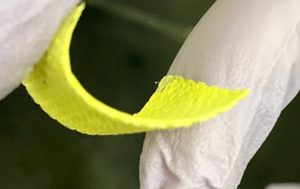The I-Corps program can enable participants to make meaningful connections, advance their careers, and create innovation that helps people and society. Two Ph.D. students from the University of Akron, Aparna Agrawal and Isaiah Kaiser, teamed up to pursue novel medical technology in both local and national NSF I-Corps. Despite not having met before I-Corps, the team has been successful in learning about their industry and fostering future innovation.
Local I-Corps – The Start of the Journey
Agrawal is a student in Dr. Sadhan Jana’s lab. They had been researching a new polymer material. This new material can be used to help treat long-term wounds and can potentially prevent serious infections. Agrawal’s mentor saw potential in the innovation and recommended that she go through the local University of Akron I-Corps program. Kaiser’s mentor, Dr. Gopal Nadkarni, introduced him to the team, and the two started learning about the wound care industry landscape together.
We were so different than most of the teams because Isaiah and I had just met before starting the program. The professor told us that we should do it together and with a person who has different skill sets than you. I was from polymer engineering, and Isaiah had more experience from taking business courses. That is how we started trying to find the potential applications for the technology, and it has really worked out very well. – Agrawal
Lessons Learned – Local to National NSF I-Corps
Through the local program, the team learned the fundamentals of customer discovery, and how their wound dressing could help patients. They identified a problem faced by doctors and patients – current wound dressings had to be changed frequently. This increased both the care requirements and the chance of serious infections. The team worked to make their semi-porous dressing last longer, therefore reducing the need to change it as often.
After success in the local program, Agrawal and Kaiser moved on to the national NSF I-Corps Teams program. They had a positive experience, learning an immense amount about their industry through focused office hour sessions with instructors, 100 customer discovery interviews, and a deep dive into their Business Model Canvas.
From Nationals (NSF-Corps), we got to dive deeper into the problem than we were doing in the local program. We realized that the problem was that wound dressings were not lasting long enough and they needed to be changed two to three times a day or two times a week. And whenever the dressings are changed, the wound gets exposed to the bacteria in the environment, and healing is stalled. – Agrawal

The team’s polymer wound dressing.
Notably, from their customer discovery interviews, they discovered a larger issue: biofilm. This thick layer of infection can wreak havoc on patients with large wounds. Biofilm can decrease the chance of healing, and in bad cases, can result in amputation of the infected region. The team realized that making their product effective at reducing biofilm would be key to its success.
We’ve gotten such good feedback even recently. Aparna and I were just in Las Vegas last weekend at a large wound care conference. And even without asking, they would explain values that they want, that are validating the value propositions that we offer. It’s really reassuring from that perspective. But I think from just a technology standpoint, we can validate these two value propositions that we’re trying to give. – Kaiser
Advanced Careers Through I-Corps
Going through the I-Corps programs provided direct benefits for the Team and their innovation; it also provided great indirect benefits as well. Agrawal describes how I-Corps helped her research:
Many fundamental projects have emerged in our lab, from what we learned from I-Corps. We are planning to apply for some NSF grants. These projects came out of these problems that we found out from the company [and the I-Corps program]. – Agrawal
Kaiser discovered a new industry that he was passionate about:
I-Corps really opened my eyes to a lot of different opportunities. It put me in front of potential customers, stakeholders, and even potential investors in some cases. From that perspective, it really changed my mindset in a lot of areas. It exposed me to a lot of new possibilities. But for me, this idea and this process has not just been a project. It has been more of a dream and something that I’ve wanted to really do. When I think about my career and life post-graduation, I see Auxilium [the team’s company], being the focal point. -Kaiser
Agrawal and Kaiser are still working on their wound care innovation. Recently, they created a company for the innovation called Auxilium Health, Inc. They are continuing to work on the company and finish their Ph.D. programs.
Are you interested in a professional development opportunity that can take your research to the next level? Check out the Great Lakes I-Corps Hub. We have courses designed specifically for MedTech and STEM teams.
Learn more:
https://www.greatlakesicorps.org/coming-events/
Written by Chris Eakin
NSF I-Corps Hub: Great Lakes Region, 2022
